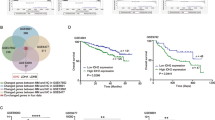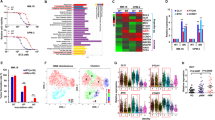Abstract
Wnt signaling has recently been implicated in carcinogenesis. We studied the activity of Wnt signaling and the methylation status of WIF1, DKK3, APC, SFRP1, SFRP2, SFRP4 and SFRP5 by methylation-specific PCR in myeloma cell lines and primary myeloma samples. Of the four cell lines, Wnt signaling was constitutively activated in LP1 and WL2, correlating with hypermethylation and hence silencing. Moreover, 5-aza-2′-deoxycytidine treatment of these two cell lines showed progressive demethylation of methylated Wnt inhibitors, re-expression of transcripts and downregulation of Wnt signaling. In both LP1 and WL2 cells, multiple Wnts and Fzs were simultaneously expressed. Treatment of WL2, in which SFRP1 was completely methylated, with recombinant secreted Frizzled-related protein 1 (SFRP1) induced downregulation of Wnt signaling and inhibition of proliferation. In primary myeloma samples, 42% patients had methylation of at least one of these seven genes, of which 61.9% had ⩾2 genes methylated. In conclusion, Wnt signaling is constitutively activated in myeloma, associated with methylation silencing of one or multiple soluble Wnt antagonists. An autocrine loop regulating Wnt signaling was demonstrated in the myeloma plasma cells, in which cellular proliferation was efficiently inhibited by recombinant SFRP1. Methylation study of a panel of genes, regulating a cellular pathway instead of isolated genes, is important.
This is a preview of subscription content, access via your institution
Access options
Subscribe to this journal
Receive 12 print issues and online access
$259.00 per year
only $21.58 per issue
Buy this article
- Purchase on Springer Link
- Instant access to full article PDF
Prices may be subject to local taxes which are calculated during checkout






Similar content being viewed by others
References
Staal FJT, Clevers HC . WNT signalling and haematopoiesis: a WNT-WNT situation. Nat Rev Immunol 2005; 5: 21–30.
Kawano Y, Kypta R . Secreted antagonists of the Wnt signalling pathway. J Cell Sci 2003; 116: 2627–2634.
Hsieh JC, Kodjabachian L, Rebbert ML, Rattner A, Smallwood PM, Samos CH et al. A new secreted protein that binds to Wnt proteins and inhibits their activities. Nature 1999; 398: 431–436.
Melkonyan HS, Chang WC, Shapiro JP, Mahadevappa M, Fitzpatrick PA, Kiefer MC et al. SARPs: a family of secreted apoptosis-related proteins. Proc Natl Acad Sci USA 1997; 94: 13636–13641.
Mao B, Wu W, Li Y, Hoppe D, Stannek P, Glinka A et al. LDL-receptor-related protein 6 is a receptor for Dickkopf proteins. Nature 2001; 411: 321–325.
Chim CS, Liang R, Kwong YL . Hypermethylation of gene promoters in hematological neoplasia. Hematol Oncol 2002; 20: 167–176.
Herman JG, Baylin SB . Gene silencing in cancer in association with promoter hypermethylation. N Engl J Med 2003; 349: 2042–2054.
Esteller M, Corn PG, Baylin SB, Herman JG . A gene hypermethylation profile of human cancer. Cancer Res 2001; 61: 3225–3229.
Ilyas M . Wnt signalling and the mechanistic basis of tumour development. J Pathol 2005; 205: 130–144.
Derksen PWB, Tjin E, Meijer HP, Klok MD, MacGillavry HD, van Oers MH et al. Illegitimate WNT signaling promotes proliferation of multiple myeloma cells. Proc Natl Acad Sci USA 2004; 101: 6122–6127.
O'Sullivan MJ, McCarthy TV, Doyle CT . Familial adenomatous polyposis: from bedside to benchside. Am J Clin Pathol 1998; 109: 521–526.
Taniguchi K, Roberts LR, Aderca IN, Dong X, Oian C, Murphy LM et al. Mutational spectrum of beta-catenin, AXIN1, and AXIN2 in hepatocellular carcinomas and hepatoblastomas. Oncogene 2002; 21: 4863–4871.
Kyle RA, Rajkumar SV . Multiple myeloma. N Engl J Med 2004; 351: 1860–1873.
Chim CS, Fung TK, Cheung WC, Liang R, Kwong YL . SOCS1 and SHP1 hypermethylation in multiple myeloma: implications for epigenetic activation of the Jak/STAT pathway. Blood 2004; 103: 4630–4635.
Chim CS, Liang R, Tam CY, Kwong YL . Methylation of p15 and p16 genes in acute promyelocytic leukemia: potential diagnostic and prognostic significance. J Clin Oncol 2001; 19: 2033–2040.
Esteller M, Sparks A, Toyota M, Sanchez-Cespedes M, Capella G, Peinado MA et al. Analysis of adenomatous polyposis coli promoter hypermethylation in human cancer. Cancer Res 2000; 60: 4366–4371.
Roman-Gomez J, Jimenez-Velasco A, Agirre X, Castillejo JA, Navarro G, Barrios M et al. Transcriptional silencing of the Dickkopfs-3 (Dkk-3) gene by CpG hypermethylation in acute lymphoblastic leukaemia. Br J Cancer 2004; 91: 707–713.
Mazieres J, He B, You L, Xu Z, Lee AY, Mikami I et al. Wnt inhibitory factor-1 is silenced by promoter hypermethylation in human lung cancer. Cancer Res 2004; 64: 4717–4720.
Brabletz T, Jung A, Reu S, Porzner M, Hlubek F, Kunz-Schughart LA . Variable beta-catenin expression in colorectal cancers indicates tumor progression driven by the tumor environment. Proc Natl Acad Sci USA 2001; 98: 10356–10361.
Tian E, Zhan F, Walker R, Rasmussen E, Ma Y, Barlogie B et al. The role of the Wnt-signaling antagonist DKK1 in the development of osteolytic lesions in multiple myeloma. N Engl J Med 2003; 349: 2483–2494.
Oshima T, Abe M, Asano J, Hara T, Kitazoe K, Sekimoto E et al. Myeloma cells suppress bone formation by secreting a soluble Wnt inhibitor, sFRP-2. Blood 2005; 106: 3160–3165.
Yaccoby S, Wezeman MJ, Zangari M, Walker R, Cottler-Fox M, Gaddy D et al. Inhibitory effects of osteoblasts and increased bone formation on myeloma in novel culture systems and a myelomatous mouse model. [see comment]. Haematologica 2006; 91: 192–199.
Qiang Y-W, Walsh K, Yao L, Kedei N, Blumberg PM, Rubin JS et al. Wnts induce migration and invasion of myeloma plasma cells. Blood 2005; 106: 1786–1793.
Merlo A, Herman JG, Mao L, Lee DJ, Gabrielson E, Burger PC et al. 5′ CpG island methylation is associated with transcriptional silencing of the tumour suppressor p16/CDKN2/MTS1 in human cancers. Nat Med 1995; 1: 686–692.
Otterson GA, Kratzke RA, Coxon A, Kim YW, Kaye FJ . Absence of p16INK4 protein is restricted to the subset of lung cancer lines that retains wildtype RB. Oncogene 1994; 9: 3375–3378.
Suzuki H, Watkins DN, Jair K-W, Schuebel KE, Markowitz SD, Chen WD et al. Epigenetic inactivation of SFRP genes allows constitutive WNT signaling in colorectal cancer. Nat Genet 2004; 36: 417–422.
Chim CS, Liang R, Leung MH, Yip SF, Kwong YL . Aberrant gene promoter methylation marking disease progression in multiple myeloma. Leukemia 2006; 20: 1190–1192.
Author information
Authors and Affiliations
Corresponding author
Additional information
Authors' contribution: CS Chim: patient care, study design, supervision of experiment, writing of manuscript, manuscript approval; R Pang: western blot study, MTT assay, manuscript approval; TK Fung: MSP, sequencing, manuscript approval; CL Choi: cell line work, MSP, manuscript approval; R Liang: patient care, supervision of experiment, manuscript approval.
Rights and permissions
About this article
Cite this article
Chim, C., Pang, R., Fung, T. et al. Epigenetic dysregulation of Wnt signaling pathway in multiple myeloma. Leukemia 21, 2527–2536 (2007). https://doi.org/10.1038/sj.leu.2404939
Received:
Revised:
Accepted:
Published:
Issue Date:
DOI: https://doi.org/10.1038/sj.leu.2404939
Keywords
This article is cited by
-
Multiple myeloma, a quintessential malignant disease of aging: a geroscience perspective on pathogenesis and treatment
GeroScience (2023)
-
SFRP1 Expression is Inversely Associated With Metastasis Formation in Canine Mammary Tumours
Journal of Mammary Gland Biology and Neoplasia (2023)
-
Epigenetic silencing of long non-coding RNA BM742401 in multiple myeloma: impact on prognosis and myeloma dissemination
Cancer Cell International (2020)
-
Targeting signalling pathways and the immune microenvironment of cancer stem cells — a clinical update
Nature Reviews Clinical Oncology (2020)
-
Nanoparticles for Manipulation of the Developmental Wnt, Hedgehog, and Notch Signaling Pathways in Cancer
Annals of Biomedical Engineering (2020)



